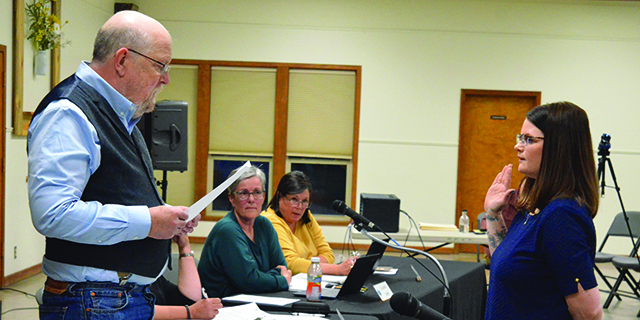Maxville nominated for National Register of Historic Places
Published 7:00 pm Thursday, October 26, 2023

- Gwendolyn Trice, executive director of the Maxville Heritage Interpretive Center, speaks with a participant in Maxville’s centennial celebration in June 2023. Four months later, Maxville was nominated for inclusion in the National Register of Historic Places, on Friday, Oct. 20.
ENTERPRISE — One of Eastern Oregon’s greatest claims to racial fame took another step forward as Maxville was nominated for inclusion in the National Register of Historic Places.
The move came Friday, Oct. 20, during a gathering of representatives of four state historic and cultural panels, which met in Wallowa County to conduct business and visit sites in the county considered worthy of cultural or historic interest.
“We’ve been working for that for many years, so it’s satisfying to know that it’s done,” said Gwendolyn Trice, executive director of the Maxville Heritage Interpretive Center in Joseph.
Maxville, about 20 miles north of Wallowa, was home to Black loggers at a time when the Oregon Constitution included a provision excluding them from the state. Maxville had a population of about 400 residents, 40-60 of them Black. It was the largest town in Wallowa County between 1923 and 1933, according to oregonencyclopedia.org.
The Bowman-Hicks Lumber Co., based in Missouri, recruited experienced loggers from throughout the South and Midwest for the Maxville logging operation, and most of them traveled by rail — in boxcars — to Wallowa County. The Great Depression and the consequent downturn in the lumber market caused Maxville’s decline and Bowman-Hicks closed the town in 1933.
But Maxville is far from forgotten. That’s largely due to the efforts of Trice, whose father, grandfather, uncles and cousins were among the loggers from Arkansas who were part of that early Black community.
It was originally called “Mac’s Town” after the company’s first boss, Trice told the gathering Friday at Fishtrap.
“It ended up being Maxville,” she said.
Work in progress
Trice noted that the former company administrative building is being reassembled at the Maxville site.
“They’re getting the roof on now,” she said.
The building was restored by Bronson Log Homebuilders in Enterprise. The 1,600-square-foot building with a two-story stone fireplace, kitchen, bathroom and large main room was dismantled in 2015 as part of the restoration process.
There also are plans for continued stewardship of the land, a new foundation for the administration building, and restorations of a baseball diamond and the sites that were originally used as schoolhouses.
Trice said the nomination to the National Register is just that — a nomination. A National Park Service official known as the Keeper of the Register of Historic Places will make the decision on the nomination, likely in February 2024.
“We’ve gone through a rigorous process already through Oregon state bodies that bring it forward to the National Register,” she said. “What it does is sets the standard across the United States.”
Gathering of historians
The nomination was made by members of the State Advisory Committee on Historic Preservation, who met at Fishtrap in Enterprise on Friday, along with members of the Historic Assessment Review Committee, the Oregon Commission on Historic Cemeteries and the Oregon Heritage Commission.
The 20-plus historic and cultural officials spent Oct. 18 touring downtown Enterprise, visiting historic buildings such as the OK Theatre. The group toured Maxville Oct. 19 as well as the Nez Perce Homeland near Wallowa, downtown Wallowa and the Wallowa History Center. They also received information on the Josephy Center for Arts and Culture in Joseph.
On Oct. 20, the visiting officials met at Fishtrap for a meeting to consider commission business, including Oregon Heritage Excellence Awards, an Oregon Heritage Commission vitality report, a presentation on the use of ground-penetrating radar in cemetery preservation, ways to improve the recognition of historic properties of importance and a report on grant-funded projects.
What does it mean?
The significance of inclusion in the National Register isn’t necessarily financial, but it could help.
“We won’t get money in the bank as a result of this, but we can use it to tap into monetary resources — state or federal — that might be available,” Trice said. “But it allows us the leverage if (the money) is available.”
So far, Maxville has been the beneficiary of state and federal grants and state lottery funds that paid for the renovation of the administration building. The interpretive center has owned the 240-acre parcel since 2022.
“We have an opportunity for a space we’re building upon,” she said during the townsite’s centennial celebration in June.





